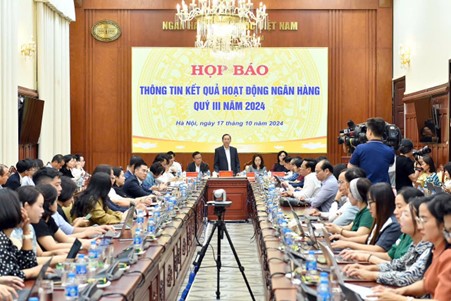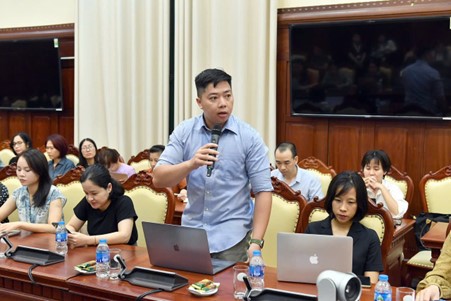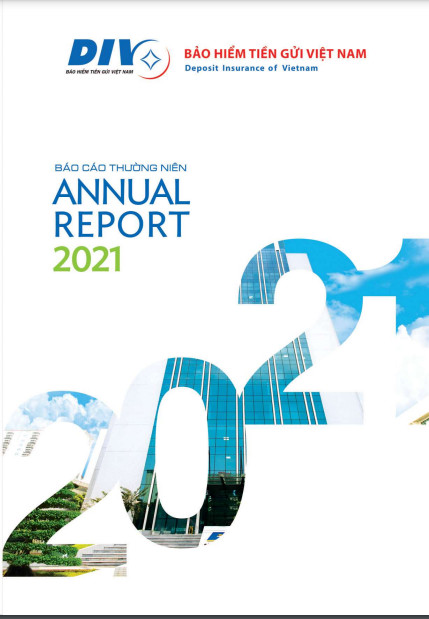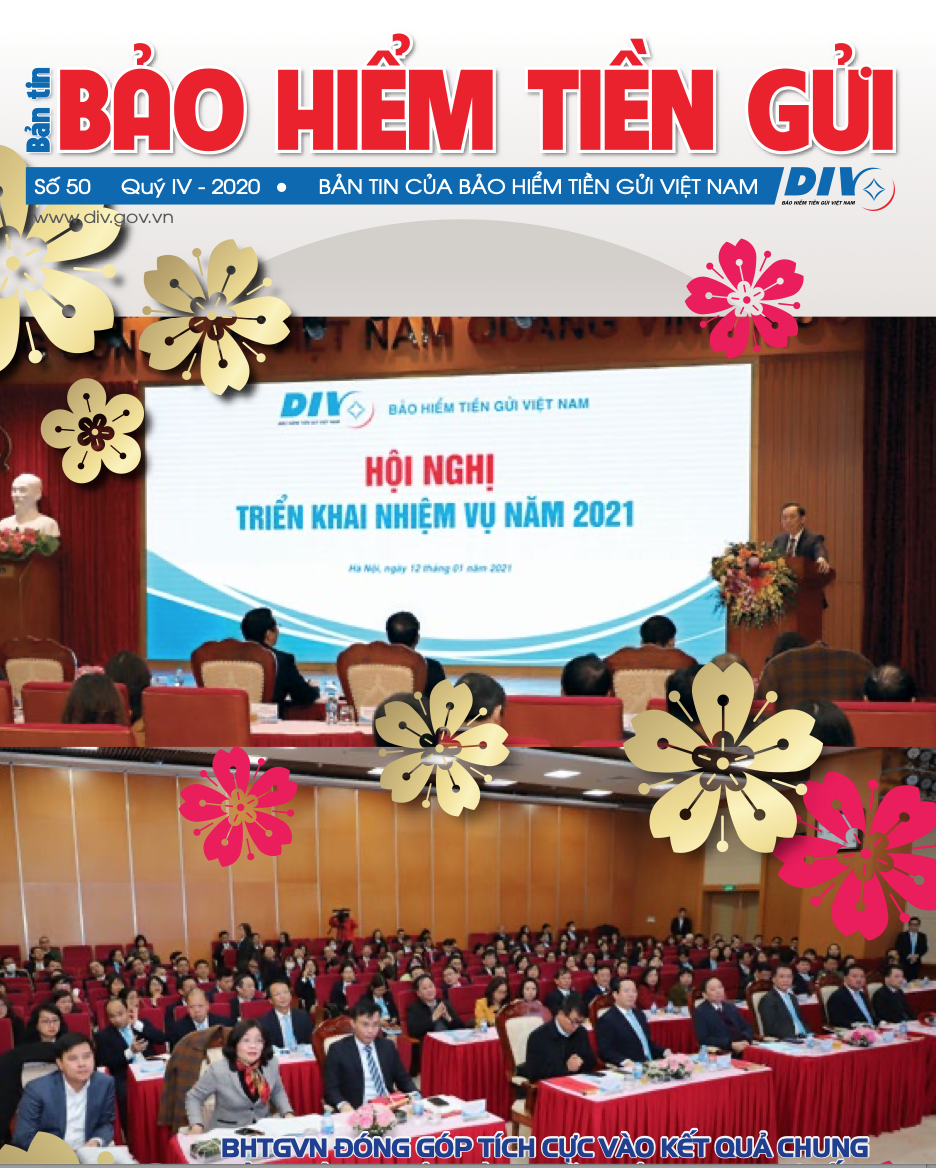
A general view of the press conference
The conference was participated by representatives from various SBV departments and functional units, commercial banks. The Deposit Insurance of Vietnam (DIV)’s participant was Ms. Phan Thi Thanh Binh, Deputy General Director.
The stability and safety of the credit institution system were maintained, depositors' legitimate rights were protected
Opening the press conference, Standing Deputy Governor Dao Minh Tu outlined a mixed picture of both Vietnam's and the world economy in the first nine months and the third quarter of 2024. Globally, inflation, albeit unpredictable, subsided in many countries, strengthening the trend for lowering interest rates among central banks worldwide. In the U.S., expectations of the Federal Reserve (FED)’s further rate cuts led to a sharp decline in the USD index. Domestically, despite ongoing difficulties and challenges—especially the damage caused by Typhoon No. 3 in northern regions—the economy's growth trajectory remains positive due to the focused, proactive leadership of the Government and the Prime Minister. Economic growth over the nine months of 2024 shows a quarter-on-quarter rising trend, with GDP increasing by 5.87% in Q1, 7.09% in Q2, and 7.40% in Q3, resulting in a 9-month GDP growth rate of 6.82% . Inflation was kept in check, supporting economic growth.
In alignment with the Resolutions of the Party, the National Assembly, the Government, the instructions of the Prime Minister, and the evolving domestic and international economic contexts, the SBV proactively implemented comprehensive measures to facilitate access to bank credit for businesses and individuals, aid economic recovery and growth, maintain macroeconomic stability, control inflation, and secure the credit institution (CI) system. specifically, the conduct of monetary policy contributes to macroeconomic stability and inflation control, provided liquidity for CIs, and maintains stability in the monetary and foreign exchange markets. In terms of interest rate management, the SBV continues to keep policy rates unchanged, enabling CIs to access low-cost funding from the SBV to support the economy. The SBV also directed CIs to continue cutting down costs to lower lending rates, publicly disclosing information on average lending rates, interest rate spreads, and loan interest rates for various credit packages and products on their websites. As a result, lending rates continued to decline from late 2023 levels.
Additionally, the SBV flexibly and appropriately manages the exchange rate to absorb external shocks, while effectively coordinating monetary policy tools. This approach ensures stability and liquidity in the foreign exchange market, helps meet the economy's foreign currency demands, and enables exchange rates to fluctuate flexibly in line with market conditions. A series of solutions, policies, and credit programs were synchronously and promptly implemented by the SBV to ensure adequate capital supply for the economy and to support economic growth.

Standing Deputy Governor Dao Minh Tu chairs the press conference
In order to facilitate CIs in providing adequate credit for the economy, the SBV on December 31, 2023, assigned all 2024 credit growth targets to CIs and publicly announced the criteria for CI self- regulated credit growth.
However, given the low overall credit growth in the economy and uneven credit growth rates among CIs - some low or even negative growth rates while others nearly reached the SBV's targets - the SBV on August 28, 2024, announced additional credit growth allowances for qualified institutions, ensuring transparency. structured, since August 28, 2024, CIs that had achieved at least 80% of their initial 2024 growth target have been permitted to adjust upward their credit outstanding, based on their performance ratings.
By the end of the third quarter, credit across the system had increased by around 9% compared to the end of 2023. With strong liquidity and room for credit expansion, CIs were well- positioned to provide capital to the economy.
In addition, the SBV includes CIs to continue proactively implementing credit programs, including a VND 120 trillion loan program for social housing, worker accommodations, and apartment renovations, as well as a loan program targeted at the forestry and lodging sectors. In response to the damage caused by Typhoon No. 3, the banking sector rapidly mobilized support measures to ease financial burdens on affected customers.
In gold market management, with instructions from the Government, coordinated solutions from the SBV, and support from related ministries, the primary objective of controlling the difference between SJC gold bar prices and international gold prices within an appropriate range was achieved.
The stability and safety of the CI system were maintained, ensuring the protection of depositors' legitimate rights. The sector continued to address and control non-performing loans, despite economic challenges impacting businesses' loan repayment capacity.
Regarding the resolution of “zero-dong banks”, Standing Deputy Governor Dao Minh Tu stated that the SBV will hold a handover ceremony for two zero-dong banks later on.
Regarding the mandatory transfer of zero- dong banks, SBV Inspectorate Deputy Chief Nguyen Duc Long clarified that, in accordance with legal provisions, the SBV had approved mandatory transfer plans for these banks. Initially, two banks will be compulsorily transferred: Vietnam Construction Commercial Bank Limited (CB) to Commercial Bank for Foreign Trade of Vietnam (Vietcombank), and Ocean Commercial One Member Limited Liability Bank (Oceanbank) to Military Commercial Joint Stock Bank (MB). These transfers aim to reintegrate these banks into the market and ensure depositors' funds are protected before and after the transfer. The transferee banks will receive structured support according to regulations.
The legal framework and policies supporting cashless payments and digital banking were enhanced further, creating favorable conditions for cashless payment growth, digital banking advancement, new technology applications, and ensuring security and safety in payment activities.
The banking sector also intensified public financial education efforts to increase consumer awareness and skills in accessing online banking services. Thanks to these efforts, cashless payment and digital transformation in the banking sector continued to see positive results.
The monetary and banking regulations were refined to ensure a safe banking system that aligns with global standards and best practices. The SBV has been actively developing and amending regulatory and guiding documents to support the implementation of the 2024 Law on Credit Institutions.
The banking sector’s objectives for the remainder of 2024
The SBV is committed to managing interest rates in alignment with market dynamics, macroeconomic conditions, inflation, and monetary policy objectives. Additionally, the SBV aims to maintain a flexible and appropriate exchange rate policy, ensure coordination with other monetary policy tools to stabilize the foreign exchange market, control inflation and maintain macroeconomic stability.
The SBV directs CIs to ensure safe and efficient credit growth, focusing on priority areas such as business production, key economic sectors, and growth drivers as prioritized by the Government. Moreover, strict monitoring of credit in potentially high-risk sectors is maintained. Efforts to streamline and simplify lending procedures aim to facilitate easier access to bank credit for businesses and people, with an expansion of credit to support both production and consumption, thus helping to limit informal or “black credit” practices.
The SBV continues to monitor and urge CIs to effectively implement government-mandated credit programs. This includes the VND 120 trillion credit program for social housing, worker accommodations, and apartment renovation, as well as the VND 30 trillion credit program for the forestry and motel sectors. Additionally, the SBV encourages CIs to provide timely support to clients affected by Typhoon No. 3.

Reporters raise questions at the press conference
The SBV remains committed to the effective deployment of the “Restructuring the Credit Institution System linked to handling bad debts in the 2021-2025 period” project, aiming to foster a healthy, high- quality, transparent CI system that adheres to legal standards and aligns with international norms. This plan promotes proactive bad debt resolution, credit quality improvement, and minimization of new bad debt occurrences.
The SBV focuses on implementing Decree No. 52/2024/ND-CP on cashless payments and associated Circulars detailing and guiding the Law on CIs and Decree No. 52/2024/ND-CP. Furthermore, the ongoing effective execution of objectives within the Plan for implementing Scheme on Cashless Payment Promotion in Vietnam for 2021-2025, the Banking Sector Digital Transformation Plan, and Plan No. 01/KHPH-BCA-NHNNVN for implementing tasks under Project 06 (Project for developing applications of citizen data, identification, and electronic verification for national digital transformation from 2022-2025, with a vision to 2030) continues to be prioritized. The SBV also ramps up the security, safety and confidentiality of banking and payment operations to protect the rights and legitimate interests of customers. Concurrently, efforts are being accelerated in public financial literacy and education to improve the knowledge and skills of the public in utilizing financial and banking services.
Research and International Cooperation Department (translation)

























